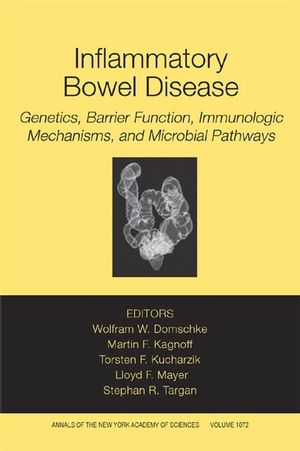Inflammatory Bowel Disease: Genetics, Barrier Function, and Immunological Mechanisms, and Microbial Pathways, Volume 1072ISBN: 978-1-57331-568-5
Paperback
432 pages
October 2006, Wiley-Blackwell
 This is a Print-on-Demand title. It will be printed specifically to fill your order. Please allow an additional 10-15 days delivery time. The book is not returnable.
|
||||||
Where Do We Go From Here?: S.R. Targan.
Part I: Genetics of Inflammatory Bowel Disease –NOD/CARD Proteins: Diagnostic and Therapeutic Consequences?:.
1. Microbial Signaling Through NOD Proteins: D. Philpott.
2. NOD2/CARD Mutations in Crohn’s Disease: J.P. Hugot.
3. Functional Relevance of NOD2 On Cellular Signalling in Crohn's Disease: G. Nunez.
4. Do Genetic Mutations Provide New Insights for Therapy?: J. Cho.
Part II: Immunologic Abnormalities in IBD – What Can We Learn From Animal Models?:.
5. Role of TGFβ in Mucosal Inflammation: W. Strober.
6. TNF/TNFR-Pathways in Chronic Inflammation: G. Kollias.
7. Lessons From Enteric Infections: L. Eckmann.
8. New Insights From Studies of Regulatory T Cell Populations: A. O'Garra.
9. the Commensal Microbial Flora: Relevance for Intestinal Inflammation: C.O. Elson.
Part III: Immunologic Disturbances in Human IBD – Defining and Manipulating the Key Pathways:.
10. Chemokines and Cell Trafficking Within the Inflamed Mucosa -- Inhibition of Chemokine Receptors or Ligands as a Potential Approach for Treatment?: I.R. Williams.
11. Life and Death – the Role of Apoptosis: T. Kucharzik.
12. Cytokines – Who Are the Key Plays and the Role for Cytokine Treatment: R.S. Blumberg.
13. Novel Signal Transduction Pathways – Relevance for Future Therapies?: M.F. Neurath.
14. NF-Kappa-B Signaling –the Pros and Cons of Altering NF-κB as a Therapeutic Approach: M. Karin.
15. Intracellular Targets: a Role for Inhibition of MAP-Kinases in Therapy?: S.J. Deventer.
16. Leucocyte Adhesion Molecules – Are They Relevant as Target for IBD Treatment?: D.B. Binion.
Part IV: Intestinal Epithelial Cells in IBD - An Active Barrier?:.
17. Tight Junction Function and the Modulation of Paracellular Permeability During IBD: a. Nusrat.
18. Epithelial Transport Under Inflammatory Conditions – Can It Be Regulated?: M.C. Berin.
19. Imbalance of Epithelial Electrolyte Homeostasis – Role in the Pathophysiology of IBD: U. Seidler.
20. Neutrophil Transepithelial Migration and Epithelial Barrier Function in IBD – Potential Targets for Inhibiting Neutrophil Trafficking: C.A. Parkos.
Part V: GALT – Relevant for Regulation of Inflammation?:.
21. Collaboration of Epithelial Cells With Organized Lymphoid Tissue: M.J. Kraehenbuhl.
22. Role of Lymphotoxins in the Development of PP and MLN – Relevance to Intestinal Inflammation and Treatment: T.W. Spahn.
23. Trafficking and Function of Mucosal Dendritic Cells: A. Iwasaki.
24. Intraepithelial T-Cells – Implication for Intestinal Inflammation: M. Kronenberg.
Part VI: Relevance of Microbial Factors – Additive Or Causative for IBD?:.
25. Microbial – Epithelial Cell Crosstalk During Inflammation: The Host Response: M. Kagnoff.
26. Role of Toll-Like Receptors in Orchestrating the Innate Immune Response – Potential Targets for Treatment?: D. Podolsky.
27. Host-Bacterial Interactions in the Gut: Signalling by Commensal Flora: J. Gordon.
28. Immunostimulatory DNA- Potential Therapeutics for Treatment of Enteric Inflammatory Disease?: E. Raz.
29. Probiotics – Their Role in Controlling Intestinal Inflammation?: J.F. Colombel.
30. Inflammatory Bowel Disease – Pandora's Box, Present and Future: J. Schölmerich.
Index of Contributors



